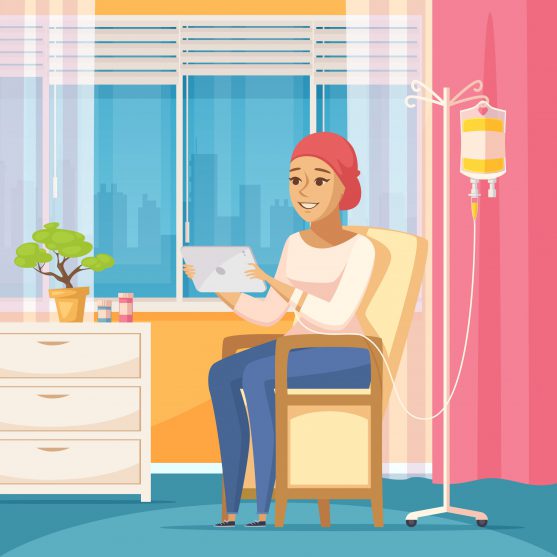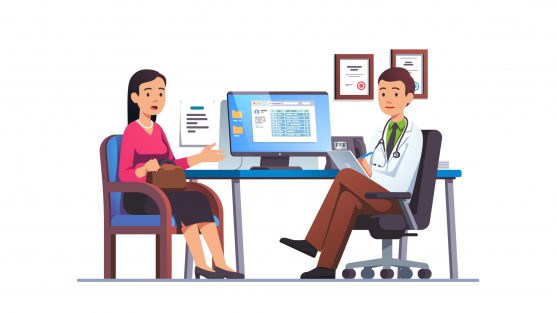The origin of the word ‘adjuvant’ comes from the Latin word ‘adjuvans’ meaning ‘to help’. In cancer treatment, these therapies ‘help’ you reach your goal of being free of the deadly disease.
This is the sole reason why your oncologist will advise you to continue your cancer treatment cycle with the valuable help of one or more adjuvant therapies.
What is Adjuvant Therapy?
Adjuvant is defined as additional treatment when it comes to cancer care. Additional or Adjuvant therapy is often given after the initial cancer treatment is completed in order to lower the risk of the cancer coming back.
The first treatment is usually surgery. Adjuvant therapies are given to you after your cancer surgery. The combination of both lines of treatment, the primary and adjuvant, work together to destroy the cancer cells in your body and aim to make you cancer-free.
Why do you need Adjuvant therapies?
Each cancer grows and behaves differently in different people. The way your body reacts to it too is different from another person with the same type of cancer. This is why oncologists plan individual cancer treatment solutions suitable for each person.
Your response to the medications, side effects if any, safe surgical options, etc, are all observed, well-documented and monitored by your oncologist before suggesting the best treatment plan for you.
While medicines are prescribed to manage the condition and to relieve the pain, surgery is almost always the first line of treatment for solid cancers. This is where your onco surgeon will strive to remove the cancerous tumour, tissues or organ, completely.
However, even if your surgery is a successful one, there is the minute possibility of tiny, microscopic cancer cells that could be left behind.
Adjuvant cancer therapies are designed to follow surgery, to clean up and completely destroy these leftover cancer cells. Sometimes Adjuvant therapy is not needed for very early stage cancers and single modality surgery or radiotherapy works well.
How does Adjuvant Therapy work?
In your war against the cancer in your body, you need all the weapons to help you win it. Surgery is one main weapon of cancer destruction while adjuvant, or additional, therapies work like the army of soldiers ready for the second line of attack.
After your surgery, oncologists advise you to take the help of this additional army to make the surgery more effective and to lessen the chance of the cancer coming back.
Many patients who complete the initial treatment do not follow up with adjuvant therapy, which is crucial to the healing process. Unfortunately, this can undo all the good work of your oncology doctors and your own painstaking effort that has gone into making you free from cancer.
It is almost like practising for months before running a marathon, only to stop and give up just when you are close to the victory line.
How can it prevent recurrence of cancer?
The different adjuvant therapies are planned to follow a systematic treatment cycle according to your type of cancer. These therapy cycles are typically monthly ones with gaps for rest.
This continuous cycle of treatment ensures that the few remaining cancer cells are constantly destroyed, hence preventing any chance of their recurrence. These therapies are given to you in the form of medications as well as the latest medical technologies in cancer care.
Types of Adjuvant therapies
Adjuvant therapies following primary cancer treatment includes one, or a combination of, the following:
Chemotherapy
This process uses powerful medicines to kill the rapidly-growing cancer cells throughout your body.

As part of the adjuvant therapy, these medicines can effectively destroy any remaining cancer cells left behind in your body after surgery or radiation therapy. The medications are given through injections, ports, pumps, the intravenous (IV) route, orally in capsule form or even applied on the skin as a patch.
Chemotherapy is administered in cycles with breaks in between. Your oncologist is the best person to chart out your chemotherapy sessions according to how your body responds and how fast you recover from each session.
Radiation Therapy
Also known as radiotherapy, this mode of cancer treatment has been proven to be the most common standard protocol adopted internationally, with over 50 per cent of cancer patients all over the world receiving it before, during, and after surgery or chemotherapy.
It involves the use of high energy X-rays or photon beams from a machine called the linear accelerator, to externally target the cancerous growth in the body.
The beams destroy the genetic material that controls the way cells grow. It is completely non-invasive and painless. In cancers that are deep inside the organs, this adjuvant radiation therapy is administered internally through a mode called brachytherapy.
Radioactive material is placed inside your body close to the cancerous tissue to consistently administer higher doses of rays at close range and in the shortest time, to kill any remaining cancer cells.
Hormone therapy
Certain cancer cells, such as those of the breast and prostate, thrive on hormones to grow and multiply. Hormone therapy is also known as endocrine therapy and is administered to block the effect of the hormones.
As an adjuvant cancer therapy, this mode of treatment is used to reduce the chance of the cancer returning after breast or prostate cancer surgery, and, to prevent or reduce the production of the hormones that can once again cause the cancer to return.
Immunotherapy
Immunotherapy, stimulates your body’s immune system or supplements it with a strong defence mechanism to fight off any remaining cancer cells after surgery. Adjuvant immunotherapy has been approved for advanced cancer stages, many of whom have a low risk of recurrence.
Targeted therapy
As the name suggests, targeted therapy is programmed to precisely target cancer cells and alter or block specific abnormalities existing within them.
In adjuvant targeted therapy designed for post-breast cancer surgery, for instance, this treatment modality effectively blocks any action of a protein that can trigger a relapse of the cells.
How effective are these therapies?
All cancer therapies are a combination of multiple treatment modalities based on years of research and clinical trials. Most of these modern medical and surgical technologies have resulted in higher rates of cure, faster and improved treatment modes, and fewer side effects.
How effective adjuvant therapies are in the prevention of cancer relapse and in determining a safe path towards cure depends hugely on a number of factors. The success rate of adjuvant therapies and potential cure therefore, depends on:
- the type of cancer
- how advanced the stage is
- how sensitive your hormones are to receiving the therapy
- the number of lymph nodes affected,
- other cancer-specific changes within the cells that reveal the possibility of the cancer coming back.
How your doctor can help you decide which one is best for you
Cancer specialists are a multidisciplinary team that coordinates to plan the best and optimal treatment protocols. Most leading cancer care centers have an expert Tumour Board of medical oncologists, onco surgeons, radiation oncologists, pathologists, gynaecologists, urologists, etc, that discusses each case and charts out an individual treatment plan for each patient.

Your oncologist will have the complete history of your condition and will customize the adjuvant therapy suited for your type and stage of cancer in discussion with your onco surgeon who will perform your surgery.
How you and your family can choose the right option
You are the most important person for your doctors and your family because you are fighting this battle at the frontline.  Depending on your overall health condition and your body’s receptiveness to the treatment modalities, your doctors will counsel you and your care-giving family on the perfect adjuvant therapies suitable for you after surgery. This is the best time to get your questions answered and your doubts clarified regarding your treatment calendar.
Depending on your overall health condition and your body’s receptiveness to the treatment modalities, your doctors will counsel you and your care-giving family on the perfect adjuvant therapies suitable for you after surgery. This is the best time to get your questions answered and your doubts clarified regarding your treatment calendar.
For example, during adjuvant chemotherapy, you might want to check if you can take pills at home instead of visiting the hospital for injections. Or know more about a strict, yet nutritional diet and exercise regimen to follow from an expert nutritionist.
Ask about the length of each cycle of treatment so you can apply for leave-from-work if you are employed. The tenure of adjuvant therapies can vary between a few weeks and several years; so it’s wise to have that ready plan.
The most important aspect of adjuvant therapy that you need to understand from your doctor is about how big a chance you have at being cancer-free if you undergo this additional post-surgical treatment.
Preparing yourself for some common side effects
Even after improvements in modern cancer therapies, still they can cause few side effects.
Ask your doctor about the typical side effects of the adjuvant therapies lined up for you. Since these can vary from person to person, you might not experience the same reactions to each medication or therapy. However, it helps to know what to expect immediately after your surgery and before you embark on the adjuvant therapies.
Some common side effects include:
- Nausea and vomiting
- Hair loss
- Low blood counts
- Muscle, bone and joint stiffness and pain
- Numbness or tingling in the nerve-endings of your fingers and toes
- Diarrhoea
- Constipation
- Change in taste
- Mouth sores
- Skin and nail changes
- Changes in vision and in the eyes
- Fatigue
- Memory changes
- Fertility issues
- Hot flushes

